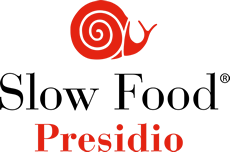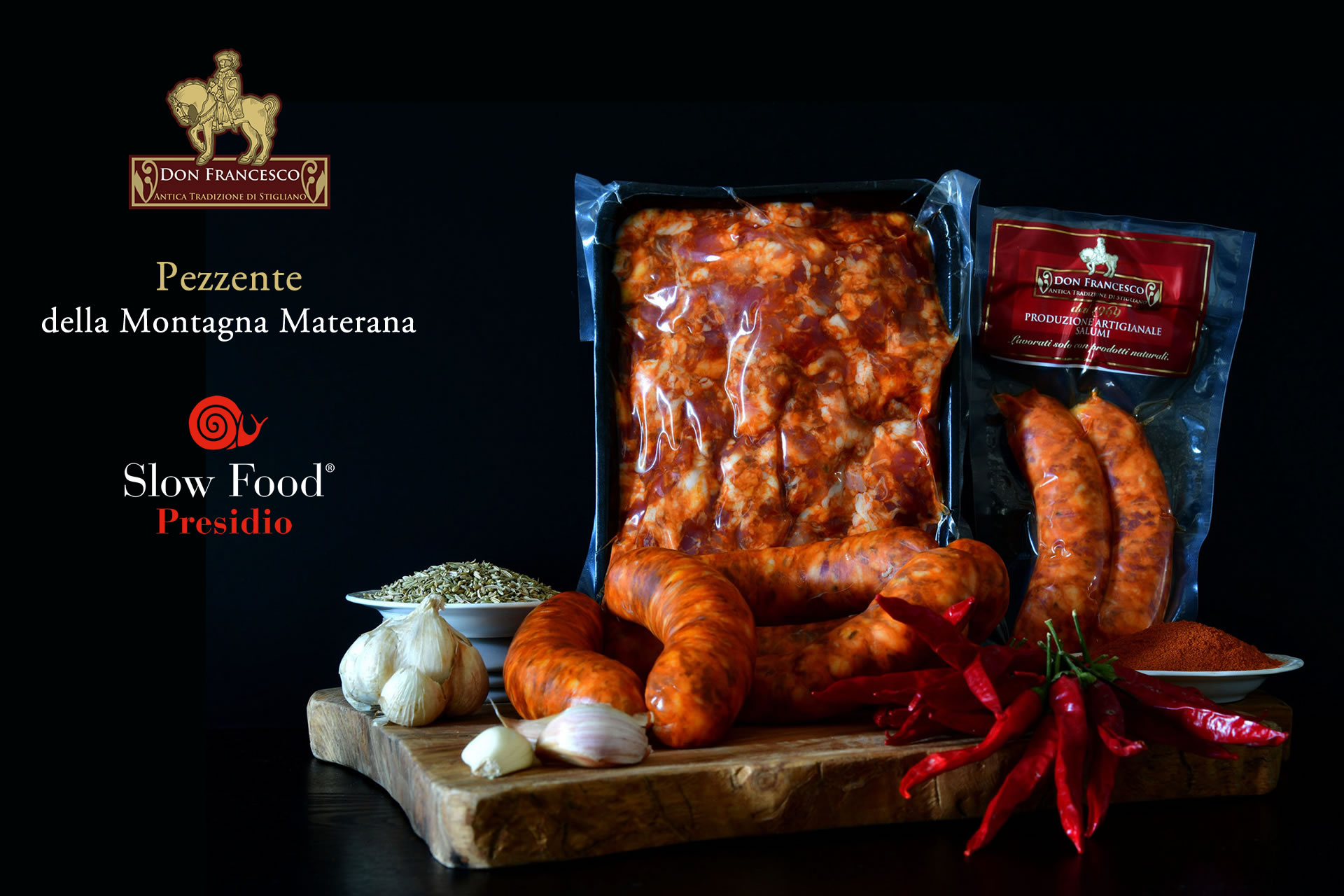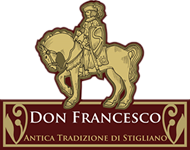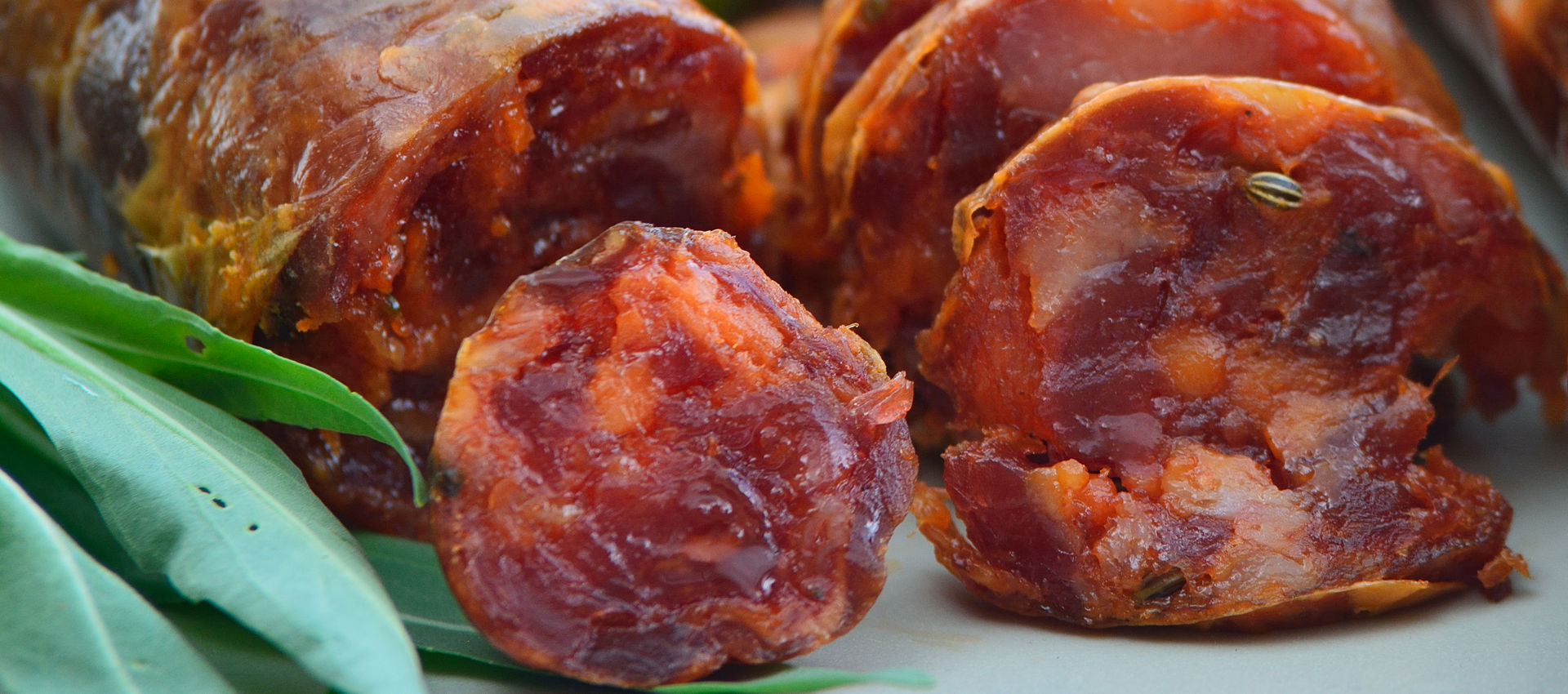
Don Francesco is a Slow Food Presidium for the production of a renowned typical Lucanian salami: the
Pezzente della Montagna Materana.
The Pezzente della Montagna Materana is prepared with the less noble cuts of the pig, cut into coarse grains according to the dictates of tradition, mixed with salt, ground sweet pepper, wild mountain fennel seeds and garlic, in traditionally measured quantities. The scent is strong due to the presence of all distinguishable spices. On the palate it is soft, with a harmonious and well-balanced taste.
>> Pezzente della Montagna Materana - Slow FoodIl Pezzente della Montagna Materana

In the forests of the Materana Mountains and the middle Basento, in the heart of Basilicata, today largely included in the Natural Park of Gallipoli Cognato and the Small Lucanian Dolomites, pigs in a not too distant past grazed freely in the undergrowth and ate tubers, roots, chestnuts, acorns, mushrooms. Most belonged to a rustic native breed, which has almost disappeared today: the Nero di Lucania. The availability of quality raw materials has strongly stimulated the very ancient production of cured meats. And among these the most particular is the beggar.
Already in 1931 the first edition of the Touring Club Guide, a mine of gastronomic information for that time, today a repertoire of good things that have often definitively disappeared, recommended stopping in the Matera area to taste the beggar. The name of this sausage refers to the origins of peasant life, the need to preserve the meat for as long as possible and, above all, to make the best use of every part of the pig. While the noble parts were used by farmers for the production of soppressata, pancetta and bacon, the poor cuts were reserved for the beggar.
Even the parts of the throat, invaded by blood at the time of slaughter, the nerves, the muscles that are most difficult to shred, the stomach, the residual fat from previous processing: everything was cut into strips and then minced. Sweet pepper from Senise, or spicy pepper, reduced to powder, wild fennel, chopped fresh garlic and sea salt were added to the mixture of meats. The same operations are still carried out today in an absolutely manual way. The most delicate phase is that of the amalgamation between meat and tanning, locally called curling: it is necessary to press the mixture vigorously with closed fists until it becomes perfectly homogeneous.
At this point it is customary to take a part of the dough and fry it in a pan (the sartascnill) to check whether the salt and the other ingredients are correctly dosed or whether it is necessary to add more before stuffing.
Seasonality
The production of pezzente takes place from November to March. The minimum maturation is two weeks for cooking and three weeks for raw consumption.
Presidiun
The most common method of consumption is in slices with good homemade bread: in this case, the maturation must last at least beyond 20 days. But beggar, in the past, was also considered a substitute for meat. It is therefore still used today to prepare the red sauce with which homemade pasta is seasoned, or combined with vegetables such as chicory, chard, escarole, and cooked, as a tasty second course, in earthenware pots. For cooking uses, a shorter seasoning of around 15 days may also be sufficient.
At the start of the project, only one producer still packaged the pezzente according to the traditional recipe with meat from pigs raised in the wild in the Matera woods; today the Presidium has welcomed a second producer who has decided to resume this typical process but the hope is that other butchers will also join the project with the aim of bringing the pezzente back to the tables of Lucanian consumers and beyond.
Production area
Province of Matera, Municipalities of Accettura, Aliano, Calciano, Cirigliano, Garaguso, Gregolane, Oliveto Lucano, Stigliano, Tricarico.

Slow Food is a large international non-profit association committed to restoring the right value to food, respecting those who produce it, in harmony with the environment and ecosystems, thanks to the knowledge of which local territories and traditions are custodians.
Every day Slow Food works in 150 countries to promote good, clean and fair nutrition for all.
>> www.slowfood.it Don Francesco is a Slow Food Presidium for the production of a renowned typical Lucanian salami: the Pezzente della Montagna Materana.
Don Francesco is a Slow Food Presidium for the production of a renowned typical Lucanian salami: the Pezzente della Montagna Materana.
 Home
Home ITA
ITA






